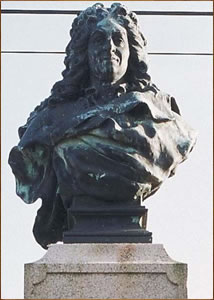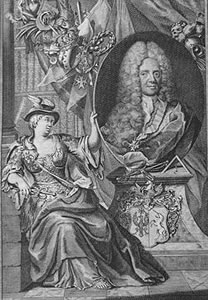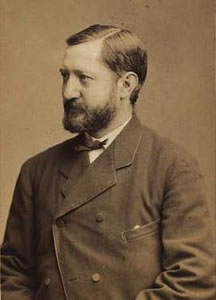De Amerikaanse schrijver Thomas Pynchon werd op 8 mei 1937 geboren in Glen Cove, Long Island, New York. Zie ook mijn blog van 8 mei 2007 en ook mijn blog van 8 mei 2008.
Uit: Inherent Vice
“She came along the alley and up the back steps the way she always used to. Doc hadn’t seen her for over a year. Nobody had. Back then it was always sandals, bottom half of a flower-print bikini, faded Country Joe and the Fish T-shirt. Tonight she was all in flatland gear, hair a lot shorter than he remembered, looking just like she swore she’d never look.
“That you, Shasta? The packaging fooled me there for a minute.”
“Need your help, Doc.”
They stood in the streetlight through the kitchen window there’d never been much point putting curtains over and listened to the thumping of the surf from down the hill. Some nights, when the wind was right, you could hear the surf all over town.
Nobody was saying much. What was this? “So! You know I have an office now? Just like a day job and everything?”
“I looked in the phone book, almost went over there. But then I thought, better for everybody if this looks like a secret rendezvous.”
OK, nothing romantic tonight. Bummer. But it might be a paying gig. “Somebody’s keeping a close eye?”
“Just spent an hour on surface streets trying to make it look good.”
“How about a beer?” He went to the fridge, pulled two cans out of the case he kept inside, handed one to Shasta.
“There’s this guy,” she was saying.
There would be. No point getting emotional. And if he had a nickel for every time he’d heard a client start off this way, he would be over in Hawaii now, loaded day and night, digging the waves at Waimea, or better yet hiring somebody to dig them for him. . . . “Gentleman of the straight-world persuasion,” he beamed.”
Thomas Pynchon (Glen Cove, 8 mei 1937)
Buttons van de cameraschuwe Pynchon
De Ierse schrijver Roddy Doyle werd geboren in Dublin op 8 mei 1958. Zie ook mijn blog van 8 mei 2007 en ook mijn blog van 8 mei 2008.
Uit: Paula Spencer
“She copes. A lot of the time. Most of the time. She copes. And sometimes she doesn’t. Cope. At all.
This is one of the bad days.
She could feel it coming. From the minute she woke up. One of those days. It hasn’t let her down.
She’ll be forty-eight in a few weeks. She doesn’t care about that. Not really.
It’s more than four months since she had a drink. Four months and five days. One of those months was February. That’s why she started measuring the time in months. She could jump three days. But it’s a leap year; she had to give one back. Four months, five days. A third of a year. Half a pregnancy, nearly.
A long time.
The drink is only one thing.
She’s on her way home from work. She’s walking from the station. There’s no energy in her. Nothing in her legs. Just pain. Ache. The thing the drink gets down to.
But the drink is only part of it. She’s coped well with the drink. She wants a drink. She doesn’t want a drink. She doesn’t want a drink. She fights it. She wins. She’s proud of that. She’s pleased. She’ll keep going. She knows she will.
But sometimes she wakes up, knowing the one thing. She’s alone.
She still has Jack. Paula wakes him every morning. He’s a great sleeper. It’s a long time now since he was up before her. She’s proud of that too. She sits on his bed. She ruffles his hair. Ruffles — that’s the word. A head made for ruffling. Jack will break hearts.
And she still has Leanne. Mad Leanne. Mad, funny. Mad, good. Mad, brainy. Mad, lovely — and frightening.
They’re not small any more, not kids. Leanne is twenty-two. Jack is nearly sixteen. Leanne has boyfriends. Paula hasn’t met any of them. Jack, she doesn’t know about. He tells her nothing. He’s been taller than her since he was twelve. She checks his clothes for girl-smells but all she can smell is Jack.”

Roddy Doyle (Dublin, 8 mei 1958)
De Oostenrijkse schrijfster Gertrud Fussenegger werd geboren op 8 mei 1912 in Pilsen. Gertrud Fussenegger overleed op 19 maart van dit jaar op 96-jarige leeftijd. Zie ook mijn blog van 8 mei 2007 en ook mijn blog van 8 mei 2008.
Uit: Goethe und wir Katholiken
„Katholiken haben es mit Goethe nie ganz leicht gehabt. Nicht, das wir etwa seine Größe bestritten hatten; aber die meisten von uns – vor allem der älteren Generation – verhielten sich gegen ihn wie die Katze zum heißen Brei: mit Vorsicht und Vorbehalten. Er galt uns als Heide, Pantheist, gar Atheist – und als unerlaubt leidenschaftlicher, allzu leicht entflammbarer und flatterhafter Liebhaber desweiblichen Geschlechts. Der jüngeren Generation wurde er überdies als Konservativer, als Fiirstenknecht und verstaubter Klassiker madig gemacht.Das Jubeljahr 1999 fordert auch uns Katholiken zu einer Art Revision auf. Zweifellos: Goethes Äußerungen über unsere Kirche waren oft nicht sehr schmeichelhaft, und sein getrübtes Verhältnis zur Romantik erschwerte von Anfang an seine Rezeption durch jene, die die Religion auch in und von der Dichtung bestätigt sehen wollten. Um so lieber nahmen sich die Kirchenfernen seiner an. In unzähligen Anthologien und selektiven Ausgaben wurde, was er je an Religionskritischem von sich gegeben, gründlichst zitiert und immer wieder hervorgehoben. So hat man ihn weithin als unerbittlichen Freigeist suggeriert und sein Bild verkürzt und verzerrt.
Nun gewiß: In den Frankfurter Bürgersohn war schon beizeiten das alte Mißtrauen gesät worden, das noch aus den Religionskriegen stammte und das er selbst später die ,,Protestantische Erbsünde” nannte: der Argwohn gegen die Kirche als Macht, der Argwohn auch gegen ihre Duldung des Menschlichen, gegen ihre nicht immer leicht durchschaubaren Formen.“
Gertrud Fussenegger (8 mei 1912 – 19 maart 2009)
De Engelse schrijfster Pat Barker werd geboren in Thornaby-on-Tees op 8 mei 1943. Zie ook mijn blog van 8 mei 2007 en ook mijn blog van 8 mei 2008.
Uit: Regeneration
“He woke to find Orme standing immediately inside the door. He wasn’t surprised, he assumed Orme had come to rouse him for his watch. What did surprise him, a little, was that he seemed to be in bed. Orme was wearing that very pale coat of his. Once, in ‘C’ company mess, the CO had said, ‘Correct me if I’m wrong, Orme, but I have always assumed that the colour of the British Army uniform is khaki. Not…beige.’ ‘Beige’ was said in such Lady Bracknellish* tones that Sassoon had wanted to laugh. He wanted to laugh now, but his chest muscles didn’t seem to work. After a while he remembered that Orme was dead.”
(…)
“Your watch is brought back by a runner, having been synchronized at headquarters.” A long pause. “You wait, you try to calm down anybody who’s obviously shitting himself or on the verge of throwing up. You hope you won’t do either of those things yourself. Then you start the count down : ten, nine, eight… so on. You blow the whistle. You climb the ladder. Then you double through a gap in the wire, lie flat, wait for somebody else to get out – and then you stand up. And you start walking. Not at the double. Normal walking speed.” Prior started to smile. “In a straight line. Across open country. In broad daylight. Towards a line of machine-guns.”
Pat Barker (Thornaby-on-Tees, op 8 mei 1943)
De Amerikaanse dichter Gary Snyder werd geboren op 8 mei 1930 in San Francisco. Zie ook mijn blog van 8 mei 2007 en ook mijn blog van 8 mei 2008.
Mid-August at Sourdough Mountain Lookout
Down valley a smoke haze
Three days heat, after five days rain
Pitch glows on the fir-cones
Across rocks and meadows
Swarms of new flies.
I cannot remember things I once read
A few friends, but they are in cities.
Drinking cold snow-water from a tin cup
Looking down for miles
Through high still air.
Civilization
Those are the peopl
e who do complicated things.
they’ll grab us by the thousands
and put us to work.
World’s going to hell, with all these
villages and trails.
Wild duck flocks aren’t
what they used to be.
Aurochs grow rare.
Fetch me my feathers and amber
*
A small cricket
on the typescript page of
“Kyoto born in spring song”
grooms himself
in time with The Well-Tempered Clavier.
I quit typing and watch him through a glass.
How well articulated! How neat!
Nobody understands the ANIMAL KINGDOM.
*
When creeks are full
The poems flow
When creeks are down
We heap stones.
Gary Snyder (San Francisco, 8 mei 1930)
De Franse schrijver, vertaler regisseur en diplomaat Romain Gary werd geboren op 8 mei 1914 in Vilnius, Litouwen. Zie ook mijn blog van 8 mei 2007 en ook mijn blog van 8 mei 2008.
Uit: Pour Sganarelle
“J’arrive ainsi à trois conceptions du roman que je voudrais tenter de combiner dans un roman total: un, le roman où l’imagination picaresque s’exerce vers l’aventure intérieure, vers les péripéties intérieures du psychisme, où le romancier imagine l’introspection : deux, le roman où l’imagination est plus libérée vers l’extérieur, dans les rapports de l’histoire de l’individu avec l’Histoire, dans un infini de formes et de péripéties, de personnages et d’identités; trois, le roman de la littérature, où le langage est exploré par l’imagination comme un monde en soi, ce qui aboutit aujourd’hui – l’étape flaubertienne du mot “juste” et de la perfection de la phrase rationelle étant dépassée – à l’étape du roman post-mallarméen où le sens est entièrement porté par le blanc, par ce qui n’est pas exprimé, et où ne règne qu’une sorte d’écho de la dernière syllabe du Mot-clé, qui retentit dans ce qui n’est pas dit dans la phrase comme une musique de l’inexprimable.”

Romain Gary (9 mei 1914 – 2 december 1980)
De Amerikaanse schrijver en criticus Edmund Wilson werd geboren op 8 mei 1895 in Red Bank, New Jersey. Zie ook mijn blog van 8 mei 2007 en ook mijn blog van 8 mei 2008.
Uit: The Sixties: The Last Journal, 1960-1972
“As a character in one of Chekhov’s plays says he’s “a man of the 80’s,” so I find that I am a man of the 20’s. I still expect something exciting: drinks, animated conversation, gaiety: an uninhibited exchange of ideas. Scott Fitzgerald’s idea that somewhere things were “glimmering.” I am managing to discipline myself now so that I shan’t be silly in this way. New York, Winter 1962
Had dinner with Wystan Auden before Elena [ Wilson’s wife ] arrived. He was pleased at having what he described as an honor on the part of the Establishment. He has been made an honorary fellow (I think that is the phrase) of Christ Church [ College, Oxford ] . I gather that he can retire and live there for nothing. He thinks that “Down There on a Visit” is Isherwood’s best book — I was just in the middle of reading it. He says the disintegrating homo on his horrible island in Greece was a real person whom he knew and the only person he knew who would drink the spirits out of lamps when there was nothing else to be had. He thought that “Paul” was the best of the stories. I agreed with him when I came to read it; but the whole book is rather disgusting. I am getting sick of this subject. The attitude in these books toward homosexuality involves of course a revolt against society. See the diatribe of the man on the island about putting the heterosexuals in ghettos. Paul is made by Isherwood into a hero. But Genet is the best of these writers. He is the most in revolt, the most genuinely an outlaw. Cambridge, Spring 1962“

Edmund Wilson (8 mei 1895 – 14 juni 1972)
De Amerikaanse schrijver Sloan Wilson werd geboren op 8 mei 1920 in Norwalk, Connecticut. Zie ook mijn blog van 8 mei 2007.
Uit: The Man in the Gray Flannel Suit
” By the time they had lived seven years in the little house on Greentree Avenue in Westport, Connecticut, they both detested it. There were many reasons, none of them logical, but all of them compelling. For one thing, the house had a kind o fevil genius for displaying proof of their weaknesses and wiping out all traces of their strengths. The ragged lawn and weed-filled garden proclaimed topassers-by and the neighbors that Thomas R. Rathand his family disliked “working around the place” and couldn’t afford to pay someone else to do it. The interior of the house was even more vengeful. In the living room there was a big dent in the plaster near the floor, with a huge crack curving up from it in the shape of a question mark. That wall was damaged in the fall of 1952,when, after struggling for months to pay up the back bills, Tom came home one night to find that Betsy had bought a cut-glass vase for forty dollars. Such an extravagant gesture was utterly unlike her, at least since the war. Betsy was a conscientious household manager, and usually when she did something Tom didn’t like, they talked the matter over with careful reasonableness. But on that particular night, Tom was tired and worried because he himself had just spent seventy dollars on a new suit he felt he needed to dress properly for his business, and at the climax of a heated argument, he picked up the vase and heaved it against the wall. The heavy glass shat
tered, the plaster cracked, and two of the laths behind it broke. The next morning, Tom and Betsy worked together on their knees to patch the plaster, and they repainted the wholes-wall, but when thepaint dried, the big dent near the floor with the crack curving up from it almost to the ceiling in theThe crack remained as a perpetual reminder of Betsy’s moment of extravagance, Tom’s moment of violence, and their inability either to fix walls properly or to pay to have them fixed. shape of a question mark was still clearly visible. The fact that the crack was in the shape of a questionmark did not seem symbolic to Tom and Betsy, noreven amusing—it was just annoying.”

Sloan Wilson (8 mei 1920 – 25 mei 2003)
De Duitse schrijver Otto Zierer werd geboren op 8 mei 1909 in Bamberg. Hij schreef meer dan honderd boeken, waaronder enige romans en een beschrijving van zijn oorlogservaringen in Rot schien die Sonne. Zijn voorkeur ging echter uit naar de geschiedenis van de mensheid vanaf de vroegste tijd die hij voor een breed publiek toegankelijk maakte.
Uit: München – Eine Stadt und ihre Geschichten aus 850 Jahren
»Leut«, sagt Max Joseph, »aufs Geld kommt’s nicht an! Wer mir die Frau und den Buben herausholt, der erhält eine schöne Belohnung!« Persönlich steigt der hohe Herr in das Gewirr der übereinanderliegenden Dachsparren und schief hängenden Zimmerdecken, die Zimmerleute, Maurer und andere Nachbarn folgen ihm, beginnen die Böden abzuklopfen und in die Tiefe zu horchen.
Der Palier Fruhholz sägt aus einem Boden ein Brett heraus und legt sich vor die so geschaffene Öffnung. »Da unt is oana!«, verkündet er. »I glaab, dass ’s der Lehrbua is!« Und tatsächlich erscheint nach einiger Zeit ein dünner Knabenarm in dem Loch. Es sieht fast so aus, als winke einer aus dem Grabe. »Ja, der Bua lebt no!«, freut sich der Spiegelmacher. »Joseph Fraunhofer hoaßt er, vierzehn Jahr is er alt und stammt aus Straubing. « Nun bemühen sich die Arbeiter um die Befreiung des Knaben. Der Kurfürst steht mitten unter ihnen und lässt sich nicht durch die besorgten Reden seiner Hofherren abhalten, selbst Hand anzulegen. Nach ein paar Stunden eifriger Bemühung wird Joseph Fraunhofer unverletzt aus der Höhle gezogen, die ihn bewahrt hat. Zu seinem Glück hatten sich einige Balken quer über seinen Kopf gelegt und so das nachstürzende Ziegelwerk abgehalten. Die Frau des Spiegelmachers freilich wird später als Leiche geborgen.
Kurfürst Max Joseph lässt den geretteten Buben in die Residenz kommen, nimmt ihn in der Kutsche mit nach Nymphenburg hinaus und stellt ihn seiner Familie vor.
Otto Zierer (8 mei 1909 – 5 maart 1983)
Slot Nymphenburg, München (Geen portret beschikbaar)
De Engelse dichter en schrijver John Meade Falkner werd geboren op 8 mei 1858 in Manningford Bruce, Wiltshire en groeide op in Dorchester en Weymouth. Hij studeerde rechten in Oxford en werd een geslaagd zakenman in de wapenindustrie, maar bleef daarnaast evenveel interesse houden voor literatuur, architectuur en heraldiek. Zijn bekendste boek is de roman Moonfleet uit 1898.
Uit: Moonfleet
„My name is John Trenchard, and I was fifteen years of age when this story begins. My father and mother had both been dead for years, and I boarded with my aunt, Miss Arnold, who was kind to me in her own fashion, but too strict and precise ever to make me love her.
I shall first speak of one evening in the fall of the year 1757. It must have been late in October, though I have forgotten the exact date, and I sat in the little front parlour reading after tea. My aunt had few books; a Bible, a Common Prayer, and some volumes of sermons are all that I can recollect now; but the Reverend Mr Glennie, who taught us village children, had lent me a story-hook, full of interest and adventure, called the Arabian Nights Entertainment. At last the light began to fail, and I was nothing loth to leave off reading for several reasons; as, first the parlour was a chilly room with horse-hair chairs and sofa, and only a coloured-paper screen in the grate, for my aunt did not allow a fire till the first of November; second, there was a rank smell of molten tallow in the house, for my aunt was dipping winter candles on frames in the back kitchen; third, I had reached a part in the Arabian Nights which tightened my breath and made me wish to leave off reading for very anxiousness of expectation. It was that point in the story of the “Wonderful Lamp”, where the false uncle lets fall a stone that seals the mouth of the underground chamber; and immures the boy, Aladdin, in the darkness, because he would not give up the lamp till he stood safe on the surface again. This scene reminded me of one of those dreadful nightmares, where we dream we are shut in a line room, the walls of which are closing in upon us, and so impressed me that the memory of it served as a warning in an adventure that befell me later on.“

J. Meade Falkner (8 mei 1858 – 22 juli 1932)
De Franse schrijver Alain-René Lesage werd geboren op 8 mei 1668 in Sarzeau. Hij geldt als de eerste schrijver in de Franse literatuur die van zijn pen kon leven. Hij studeerde rechten in Parijs. Zijn schrijvers loopbaan begon moeizaam met vertalingen van Spaanse stukken. In 1707 kwam de doorbraak met de komedie Crispin, rival de son maître.
Uit: Histoire de Gil Blas de Santillane
„Nous passâmes auprès de Pontferrada, et nous allâmes nous mettre en embuscade dans un petit bois qui bordait le grand chemin de Léon. Là, nous attendions que la fortune nous offrît quelque bon coup à faire, quand nous aperçûmes un religieux de l’ordre de Saint-Dominique, monté, contre l’ordinaire de ces bons pères, sur une mauvaise mule. Dieu soit loué, s’écria le capitaine en riant, voici le chef-d’œuvre de Gil Blas. Il faut qu’il aille détrousser ce moine. Voyons comment il s’y prendra. Tous les voleurs jugèrent qu’effectivement cette commission me convenait, et ils m’exhortèrent à m’en bien acquitter. Messieurs, leur dis-je, vous serez contents. Je vais mettre ce père nu comme la main, et vous amener ici sa mule. Non, non, dit Rolando, elle n’en vaut pas la peine. Apporte-nous seulement la bourse de Sa Révérence. C’est tout ce que nous exigeons de toi. Là-dessus je sortis du bois, et poussai vers le religieux, en priant le ciel de me pardonner l’action que j’allais faire. J’aurais bien voulu m’échapper dès ce moment-là. Mais la plupart des voleurs étaient encore mieux montés que moi : s’ils m’eussent vu fuir, ils se seraient mis à mes trousses, et m’auraient bientôt rattrapé, ou peut-être auraient-ils fait sur moi une décharge de leurs carabines, dont je me serais fort mal trouvé. Je n’osai donc hasarder une démarche si délicate. Je joignis le père, et lui demandai la bourse, en lui présentant le bout d’un pistolet. Il s’arrêta tout court pour me considérer ; et, sans paraître fort effrayé : Mon enfant, me dit-il, vous êtes bien jeune.“

Alain-René Lesage (8 mei 1668 – 17 november 1747)
De Duitse dichter Johann von Besser werd geboren op 8 mei 1654 in Frauenburg (tegenwoordig Saldus in Letland). Hij studeerde theologie in Königsberg en rechten in Leipzig. Koning Frederik I van Pruisen benoemde hem in 1690 tot hofdichter. In 1717 werd hij geheim raadsheer en ceremoniemeester aan het hof van August de Sterke in Dresden.
Liebe will was eignes haben
1.
Wer liebet solchen mund
Dem alle küsse schmecken
Und jederman mag lecken
Und machen ungescheut die heisse flammen kund
Der heut mit diesem scherzet
Und morgen jenen herzet
Ja der mit tausenden macht einen liebes-bund?
Wer liebet solchen mund?
2.
Da sitzt die biene nicht
Wo wilde hummeln sitzen:
Sie sucht die süssen ritzen
Da noch das wespen-heer nicht honig draus gekriegt.
Auch wo vergiffte spinnen
Den geiffer lassen rinnen
Und wo die raupe schon ihr nest hat eingericht
Da sitzt die biene nicht.
Johann von Besser (8 mei 1654 – 10 februari 1729)
Zie voor onderstaande schrijvers ook mijn blog van 8 mei 2007.
De Deense schrijver Sophus Schandorph werd geboren op 8 mei 1836 in Ringstedt.



















